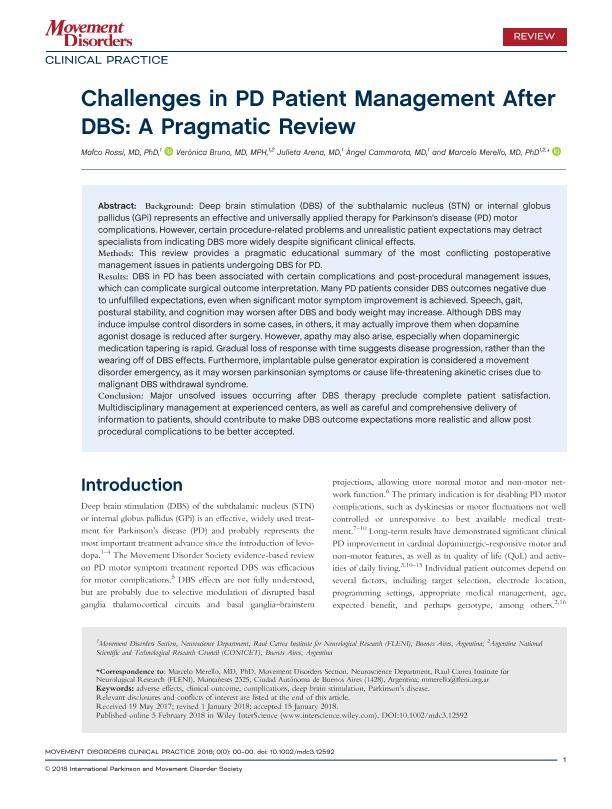Artículo
Challenges in PD Patient Management After DBS: A Pragmatic Review
Rossi, Malco Damián; Bruno, Veronica Andrea ; Arena, Julieta; Cammarota, Ángel; Merello, Marcelo Jorge
; Arena, Julieta; Cammarota, Ángel; Merello, Marcelo Jorge
 ; Arena, Julieta; Cammarota, Ángel; Merello, Marcelo Jorge
; Arena, Julieta; Cammarota, Ángel; Merello, Marcelo Jorge
Fecha de publicación:
05/2018
Editorial:
Wiley Blackwell Publishing, Inc
Revista:
Movement Disorders Clinical Practice
ISSN:
2330-1619
Idioma:
Inglés
Tipo de recurso:
Artículo publicado
Clasificación temática:
Resumen
Background: Deep brain stimulation (DBS) of the subthalamic nucleus (STN) or internal globus pallidus (GPi) represents an effective and universally applied therapy for Parkinson's disease (PD) motor complications. However, certain procedure-related problems and unrealistic patient expectations may detract specialists from indicating DBS more widely despite significant clinical effects. Methods: This review provides a pragmatic educational summary of the most conflicting postoperative management issues in patients undergoing DBS for PD. Results: DBS in PD has been associated with certain complications and post-procedural management issues, which can complicate surgical outcome interpretation. Many PD patients consider DBS outcomes negative due to unfulfilled expectations, even when significant motor symptom improvement is achieved. Speech, gait, postural stability, and cognition may worsen after DBS and body weight may increase. Although DBS may induce impulse control disorders in some cases, in others, it may actually improve them when dopamine agonist dosage is reduced after surgery. However, apathy may also arise, especially when dopaminergic medication tapering is rapid. Gradual loss of response with time suggests disease progression, rather than the wearing off of DBS effects. Furthermore, implantable pulse generator expiration is considered a movement disorder emergency, as it may worsen parkinsonian symptoms or cause life-threatening akinetic crises due to malignant DBS withdrawal syndrome. Conclusion: Major unsolved issues occurring after DBS therapy preclude complete patient satisfaction. Multidisciplinary management at experienced centers, as well as careful and comprehensive delivery of information to patients, should contribute to make DBS outcome expectations more realistic and allow post procedural complications to be better accepted.
Archivos asociados
Licencia
Identificadores
Colecciones
Articulos(SEDE CENTRAL)
Articulos de SEDE CENTRAL
Articulos de SEDE CENTRAL
Citación
Rossi, Malco Damián; Bruno, Veronica Andrea; Arena, Julieta; Cammarota, Ángel; Merello, Marcelo Jorge; Challenges in PD Patient Management After DBS: A Pragmatic Review; Wiley Blackwell Publishing, Inc; Movement Disorders Clinical Practice; 5; 3; 5-2018; 246-254
Compartir
Altmétricas



